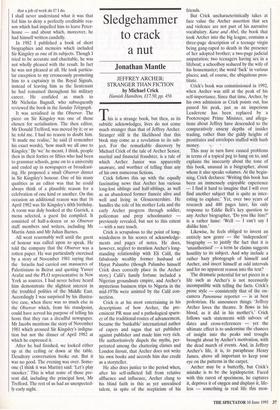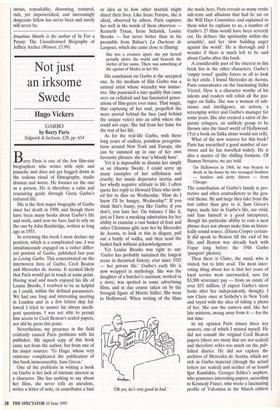Sledgehammer to crack a nut
Jonathan Mantle
JEFFREY ARCHER: STRANGER THAN FICTION by Michael Crick Hamish Hamilton, £17.50, pp. 456 This is a strange book, but then, as its subtitle acknowledges, lives do not come much stranger than that of Jeffrey Archer. Stranger still is the likelihood that this bbok may come as a revelation to its sub- ject. For the remarkable discovery by Michael Crick of the tale of Archer Senior, marital and financial fraudster, is a tale of which Archer Junior was apparently unaware, and worthier of telling than any of his own numerous fictions.
Crick follows this up with the equally fascinating news that Archer has various long-lost siblings and half-siblings, as well as an abandoned former fiancée alive and well and living in Gloucestershire. He handles the role of his mother Lola and the early Archer progress through soldier, policeman and prep schoolmaster — previously revealed, but not to this extent — with a sure touch.
Crick is scrupulous to the point of long- windedness in his scores of acknowledge- ments and pages of notes. He does, however, neglect to mention Archer's long- standing relationship with Eli Calil, the fabulously wealthy former husband of Hayat Palumbo (though Palumbo himself Crick does correctly place in the Archer story.) Calil's family fortune included a Nigerian groundnuts empire, and Archer's mysterious business trips to Nigeria in the mid-1970s were assisted by the Calil con- nection.
Crick-is at his most entertaining in his descriptions of how Archer, the pre- eminent PR man and a pathological spurn- er of the traditional-routes of advancement, became the 'bankable' international author of capers and sagas that set publisher against publisher and made him very rich. He authoritatively dispels the myths, per- petrated among the chattering classes and London literati, that Archer does not write his own books and accords him due credit as a storyteller.
He also does justice to the period when, after his self-inflicted fall from relative affluence and influence, Archer clung to his blind faith in this as yet unrealised talent, in spite of the scepticism of his friends.
But Crick uncharacteristically takes at face value the Archer assertion that sex and violence are not part of his narrative vocabulary. Kane and Abel, the book that took Archer into the big league, contains a three-page description of a teenage virgin being gang-raped to death in the presence of her adopted brother; a two-page judicial amputation; two teenagers having sex in a lifeboat; a schoolboy seduced by the wife of his housemaster; the word 'fuck' in various places; and, of course, the ubiquitous pros- titute.
Crick's book was commissioned in 1992, when Archer was still at the peak of his self-importance. Since that time, Archer, by his own admission as Crick points out, has passed his peak, just as an imperious Leaderene has been replaced by a Pooteresque Prime Minister, and allega- tions about Jeffrey have descended to the comparatively unsexy depths of insider trading, rather than the giddy heights of prostitutes and envelopes stuffed with hush money. • This may in turn have caused problems in terms of a topical peg to hang on to, and explains the insecurity about the tone of this book, unusual in a biographer, about whom it also speaks volumes. At the begin- ning, Crick declares: 'Writing this book has been an immensely enjoyable experience — I find it hard to imagine that I will ever find another subject that is quite as inter- esting to explore.' Yet, over two years of research and 400 pages later, his only response to Eddie Bell's key question to any Archer biographer, 'Do you like him?' is a rather lame: 'Well — I can't say I dislike him.'
Likewise, he feels obliged to invent an entirely new genre — the 'independent' biography — to justify the fact that it is 'unauthorised' — a term he claims suggests hostility to its subject. And why include a rather hazy photograph of himself and Archer, and insert himself at odd intervals and for no apparent reason into the text?
The dramatic potential for set pieces in a life such as Archer's is not necessarily incompatible with telling the facts. Crick's prose style — consistently that of the on- camera Panorama reporter — is at best pedestrian. He announces things: 'Jeffrey Archer loves the theatre. It flows in his blood, as it did in his mother's.' Crick follows such statements with salvoes of dates and cross-references — yet the ultimate effect is to undermine the chances of insight into the peaks and troughs brought about by Archer's motivation, with the dead march of events. And, in Jeffrey Archer's life, it is, to paraphrase Henry James, above all important to keep your eye on the patterns in the carpet.
Archer may be a butterfly, but Crick's mistake is tt) be the lepidopterist. Faced with this rarest of specimens, he captures it, deprives it of oxygen and displays it, life- less — something in real life this mon- strous, remarkable, disarming, tortured, rich, yet impoverished, and increasingly desperate fellow has never been and surely will never be.
Jonathan Mantle is the author of In For a Penny: The Unauthorised Biography of Jeffrey Archer (Warner, £5.99).



































































 Previous page
Previous page